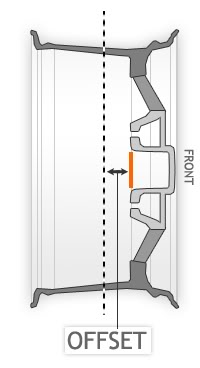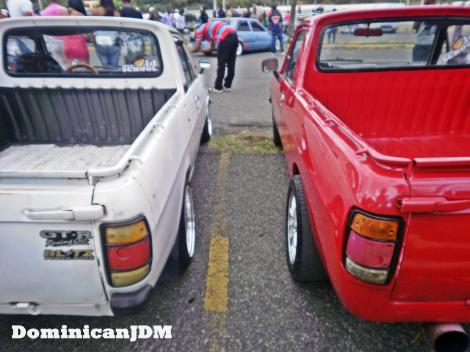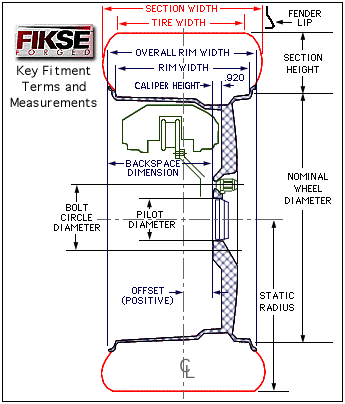The Datsun 1200 stock wheel is 30 mm positive offset (mounting face is 30mm outboard of the wheel's center line). This offset perfectly centers the tire inside the wheel housing. Note that the offset number is not directly related to wheel width or diameter, but is just the measurement relative to the wheel centerline.
Contents |
Overview
Offset * +30 stock Datsun 1200 wheel * +40 S13 Nissan Silvia * +40 and higher: FWD
Flush vs No-rub
When choosing an offset, many want a "flush" wheel - one that is flush with the side of the car. This looks good but the tire will rub on turns or bumps, unless a very small diameter tire is used.
For a no-rub tire, the wheel offset should be chosen to place the tire with enough clearance. Typically this is 20 mm inch inside the fenders, leaving enough space for the fender lip.
It all really depends on the tire width, and to a lesser extent the tire diameter. To make maximum use of the wheelwell width:
- Front: 3.25" is the maximum backspace (which is used by the stock 4" wheel). So if going wider, the offest must be reduced from +30.
- Rear: +30 offset works best with Datsun 1200, centering the wheel so a maximum tire width can be fitted (namely 205 width).
Backspacing
POST 1200rallycar:you want about 110mm backspace ...
you will need upgraded struts on front with that size [15x7] wheel, for the tyre to clear the spring cup
also 7's is really fat for a 1200 front end, will need pumping to get clearance 8's on the back will require pumping also
having stretched tyres will help with that a little, 195 tyre is ample for the weight of a 1200 for typical applications, which is quite a skinny tyre for 8 inch rim!!!
1200 front end will also require footwell to be beaten back and front corner of gaurd to be modified out of the way of the turning circle
7" width +15 backspace = 117 mm 8" width +0 backspace = 114 mm
Offset Charts
These charts are for tyre-manufacturer-suggested wheel sizes. Stretched tire guidelines will be different as the wheel width will be more important than the tire width.
NOTE: Test before purchasing. These charts ARE NOT TESTED, just theoretical
No Body Mods
NOTE:
- At the min offset, the tire will be very close to the outer bodywork (fender/guard)
- At the max offset, the tire will be close to the spring.
Rear
These should clear inner fender lip and leaf spring both. Test them before buying.
Tire width Wheel width Offset 155 4" 6 to 58 165 4" 7 to 56 165 4.5" 12 to 52 175 5" 16 to 48 185 5.5" 21 to 43 195 5.5" 26 to 38
Front
With stock 1200 suspension at stock ride height estimated to clear inner fender lip and coil spring both * MEASURE to be sure Tire size Offset 155/80R12 0 to +40 165/70R12 +5 to +35 165/55R12 +5 to +35 175/70R12 +10 to +30 175/70R13 +10 to +30 175/80R13 +10 to +30 185/60R13 +15 to +25 205/60R13 +10 to +20 will hit on turns
With Rolled Guards
REAR SEDAN Tire size Min. Offset Max. Offset 205/45R16 23 29 205/60R13 24 27
With 1" Flares
REAR SEDAN Tire size Min. Offset Max. Offset 205/55R14 2 25 215/50R14 5 22 225/50R15 8 18 235/45R17 10 17
Overview
What wheel offset is best? You often hear "I used such and such and it worked" but rarely give the suspension mods, tyre size, body modifications or disclosed if and how much it rubs. Actual measurement and details are needed. Let's start with a stock size tire and stock width wheels.
Negative Offset shifts the wheel outwards

+30 offset is optimum for the rear of Datsun 1200, as the wheel hub face is exactly -30mm offset in the middle of the wheelwell. So a 30 offset wheel will center the tire in the well, allowing the maximum width within stock bodywork.
+30 centers the tire (and wheel) in the rear wheelwell:

Less positive offset will move the tyre outboard:

Additional positive offset will move the tyre inboard:

NOTE: +30 is used for front too and keeps the tyre clear of the guards as it swings around. Due to the strut there is limited backspace, so +30 only works with 4" wide front wheels. For wider wheels, less offset is required.
The offset doesn't mean much without knowing the tire width. All offset will tell you is if the tires will be offset towards the vehicle centerline (more + offset) or away from the vehicle centerline (more - offset). But it doesn't say how far the edge of the tire will be from the body -- for that you need to know the tire width along with the offset.
Stock Offset| model | Wheel type | Offset | wheel width | Tire width |
|---|---|---|---|---|
| B110 | steel | 30 mm (1.18 in) | 4" wide wheel | 155 mm |
| B210/B310 | steel | 30 mm (1.18 in) | 4.5" | 155 mm |
| B210/B310 | aluminum | 25 mm (0.98 in) | 5" wide wheel | 175 mm |
From this table we might conclude:
- Using B210 wheels on B110 results in a 1/2 inch wider tread width (measured from outside-sidewall to outside-sidewall). NOTE: These still fit under unmodifed B110 fenders.
- B210/B310 Factory Steel vs. Aluminum wheels have different widths -- the alloy wheels are 1/2" wider (13mm), and the wheel offset is 5mm less.
- The option wheels came from the Datsun 610, so the offset is not specific to the B210.
Measuring Offset
Wheel Offset is the difference between the flange and the wheel centerline.

NOTE: The centerline is not 1/2 the rim width. It is half the overall width. For example, a 6-inch wide rim is actually about 7" wide overall.


Technically, to measure Offset you don't need to know the wheel width, as long as you can establish the centerline. The centerline can be the center of the overall wheel width, or the center of wheel rim width, or the centerline of the tire width.
- Lay wheel flat on the ground (outside face down). You can also do this with tire mounted if it is aired up.
- Lay straightedge or straight sawn lumber piece across it, measure to the ground. Divide by two and you have the centerline.
- Measure down to the flange back face
- Subtract the two measurements. Offset = (centerline) - (distance to flange)

- Zero Offset: The wheel is centered exactly over the hub face
- + Offset: The wheel is offset towards the inside of the car
- - Offset: The wheel is offset towards the outside of the car
Measuring Chassis Offset
How does wheel offset relate to the chassis? Well obviously there is a limited amount of room for tires in the wheelwell. That is your maximum tire width. The wheel offset then determines the position of the tire within the well, either centered, or offset towards the outside or towards the inside.
So what EXACTLY are those measurements?
To measure:
- take your existing wheels off. block at the hub so stock ride height is kept. (don't jack one side higher than the other)
- measure the distance from the brake hub face to the fender lip. This is your face measure.
- measure the distance from the brake hub face to the spring. This is your back measure.
- Add the two together and you have your well width
- Allow some room for clearance and now you have your max width tire.
Front well width: approximately 198mm Optimum offset: * 4" +30 for tires up to 165-wide * 5" +17 for tires up to 175-wide * 6" +5 for tires up to 185-wide
Front 3.25" is the maximum backspace (which is used by the stock 4" wheel). So if going wider, the offest must be reduced from +30.
Rear well width, Sedan: approximately 220mm Rear well width, Coupe: ??? Rear well width, Truck: ??? Optimum offset: +30 for tires up to 195-wide rear * 205s may be used ? with 5.5 inch wheels * With wider wheels, 205s may rub, depending on tolerance
Front Wheelwell
On the front, the key measurement is the distance between the fender (guard) and the coil spring.
Measure your 1200
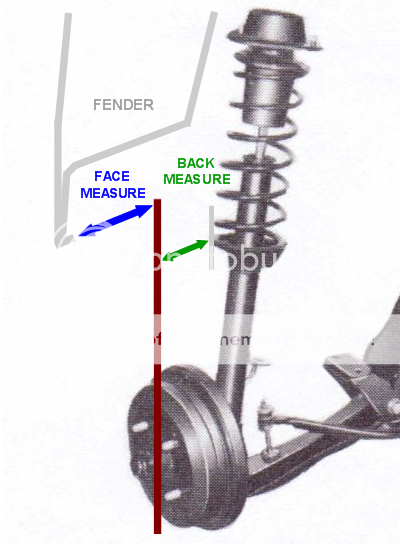
Sample Measurements Face measure: 109 mm (4.3 inch) Back measure: 89 mm (3.5 inch) Total well width: 198mm
The Back Measure never changes (the angle between the strut and spindle is welded).
NOTE: The McPherson front suspension is on an angle, so as the wheel moves up (or body down, when cornering), the tire is angled slightly inward. Thus the Face Measure changes as the wheel moves up and down. This is no problem because as it moves up there is more clearance, and as it drops down it goes below the fender lip. This is countered by body lean when cornering, and somewhat cancels out the effect.
Clearance with 5" wheel -2 offset, will hit the guards unless small-diameter tires are used (165/55R12 shown)
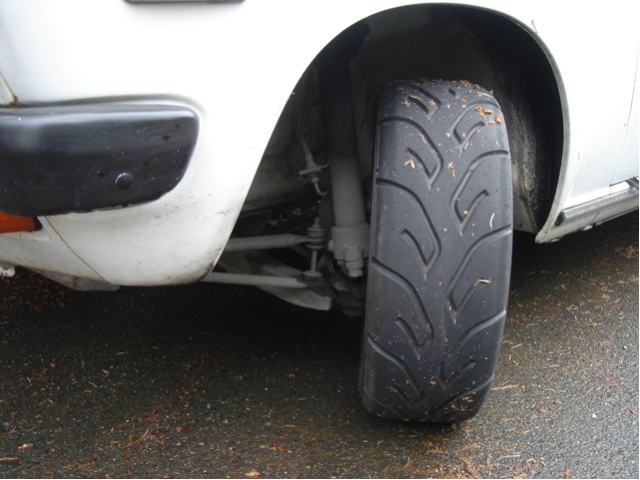
Changing camber settings from stock (to -VE camber) via adjustable Strut Tops will increase Face clearance - so no problem. If negative camber is acheived via longer LCA, it reduces face clearance (potential problem). In no case is back measure changed, as the strut-to-spindle angle is fixed by welding.
The strut can be modified to gain more clearance. Changing from the factory coilover springs (110 mm diameter) to aftermarket small-diameter springs (2.25") might gain about 15mm additional backspace.
Stock wheel 12x4 +30 uses the maximum backspace (which is 3.25")

Computed Maximum offset - FRONT (check before purchase) 4" wide +30 (to +12 minimum) 5" wide +18 (to 0 minimum) 6" wide +5 7" wide -8 with Rolling the Guard LESS offsets can be used with Flares
Modifying Wheel Well
With a bad offset, a deep dish, or just plain large tyres, when you turn the wheel the front tyre may hit the inner guard. In the straight and with gentle turning there is no scrub at all, but there can be scrub against the footwell in a heavy turn near full lock.
See main article: Modifying Foot Well
Rear Wheelwell
On the rear, the key measurements are the distances between the fender and the leaf spring.

Ute: Face measure: 75 mm Back measure: 140 mm (5-1/2 inch)
Sedan: Face measure: ~80 mm (3-1/8 inch) Back measure: 140 mm (5-1/2 inch) Total well width: ~220mm Center = ~220mm /2 = ~110 mm Hub offset: -30 (110mm centerline - 140mm back measure = offset)
1200 Sedan hub is offset -30 mm from centerline of the wheelwell. So +30 offset wheels will perfectly centered inside the rear well.
NOTE: rear axle assembly is rarely centered in the car, so left and right measurements differ by up to 10mm commonly
Example photo: Sedan with +0 wheel.

A zero-offset wheel will be positioned to the outside as in the photo. Note that these tyres are flush with the body, but there is an excess of clearance to the leaf spring. So wider tires would fit, but only if the offset is changed.
Choosing Wheel Offset
When choosing aftermarket wheels, a small amount of positive offset is desirable. This preserves the original suspension design factors and loads on the bearings.
- Stock +30 offset works with up to 175-width tires (requiring 5" to 6.5" wide wheels).
- For wider tires, you must use less wheel offset to move the tire further outboard (away from the spring). But this may foul the bodywork.
The offset and wheel width work together to locate the wheel inside the bodywork.
Negative Offset "Deep dish" old-school wheels have lots of negative offset
Positive Offset FWD wheels typically have lots of positive offset Datsun 1200 stock wheels have a mild amount of positive offset
Normal Width Tires
For tires from 155-wide to 175-wide (front) up to 195-wide (rear) use a +30 offset.
The rear wheel mounting face (face of the drum brake) is offset -30mm from the center of the wheelwell. So using a +30mm offset wheel perfectly centers the tire in the wheelwell. Just like the stock wheels (+30 offset). Those clever Datsun engineers!
SEDAN
It may be possible to get 215-width tires under the stock bodywork (with Rolling the Guard) and fender pulling. Club member orange-1200 POST reports he has 215/40R16 on 7" wide wheels. The tires rub with a heavier than normal load or when going over a bump.
TRUCK
matty has POST reported fitting 225/45R15 under the rear of his ute.
Narrow Tires
For skinny tires, you may wish to move the tire outward close to the fender, giving it a more full look. A +10 offset for 155-width tires or +15 offset for 165-width tires will do this.
Extra-Wide Tires
For tires wider than 175-wide (front) or 195-wide (rear), they will only fit by moving the into the fender opening. This will be OK for 185/205 by rolling the guards.
For even wider tires, use a very low profile tire so it won't go up and hit the fender lip, or better yet add fenders flares.
Here are some reports by club members indicating what offsets they have made work. Many of these place the wheel face outside of the fenders.
- Zero offset works well up to 6"-wide wheels.
- 6.5 and 7" wheels need to be tucked inside a a little more and so require +10 to +15 offset.
- 8" wheels need to be tucked outside to fit, so require -5 or more negative offset and will stick out past the bodywork.
FWD Wheels
NOTE that front-wheel-drive cars use wheels with highly positive offsets. This is to say that the mounting surface is far outboard of the wheel's center line, with the wheel tucking inside. Often they will fit the 1200 if wheel spacers are used to bring the mounting surface back toward the wheel's centerline.
Offset for Wider Diffs
When fitting a wider diff, you can still fit the same tires if wheels with a different offset are used.
For example if the diff is 50mm (2") wider, use wheel with 25mm more positive offset. Then the tires will be centered in exactly the same place. 165 tires can work with +55 offset wheels.
Wider tires on +55 wheels will cause the tires to hit the leaf springs, but using less offset will push the tire outside.
NOTE: Because the offset is the measure relative to the centerline, and so is Track, the wheel and tire diameter are irrelevant to this diagram. So is the wheel width. The offset only specifies the centering factor.
Wheel & tire width do become important in figuring out if the tire will hit the bodywork or foul on the leaf spring. For tires too wide to fit inside the bodywork, you can either move the leaf springs inboard (difficult) or use a less-offset wheel to push the tire outside the bodywork. Small diameter tires will be OK, but large diameter tires will needs mods to the body such as cutting the opening larger and covering it with an overfender flare.
Wheels
Offset Mockups
Virtual cardboard mockups.
7" wheel



Rim Widths
Tire manufacturer recommended wheel widths
Tyre size Rim width 155/80R12 4-5" 155/80R13 4-5" 165/70R12 4.5-5.5" 175/70R13 4.5-6" 175/65R14 5-6" 175/65R15 5-6" 175/60R15 5-6" 185/70R13 4.5-6" 185/65R15 5-6.5" 185/60R13 5-6.5" 185/60R15 6-6.5" 195/60R15 5.5-7" 195/55R16 5.5-7" 205/60R13 5.5-7.5" 205/50R15 5.5-7.5"

![[Datsun 1200 encyclopedia]](/wiki/upload/wiki.png)
